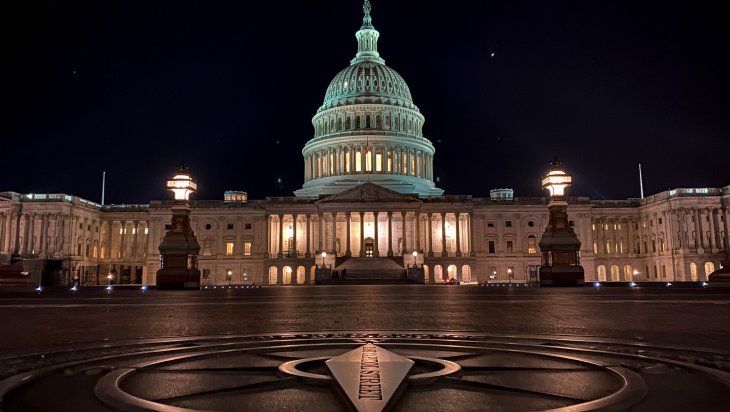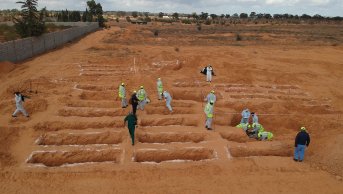Libya Stabilization Act: Peace and Sanctions

Intense diplomacy and peace efforts have been observable in Libya for a while. Recently, Libyans themselves have been trying to draw their future with the support of the United Nations and separate member states such as Turkey and Germany. The process, mainly led by the United Nations Support Mission in Libya (UNSML), has paved the way for a ceasefire agreement between the Government of National Accord (GNA) and Haftar forces, and has enabled the implementation of the Libyan Political Dialogue Forum (LPDF), which is based on designing a fresh constitution, prioritizing elections, and basically re-establishing a legitimate government with fairly chosen senior officials. The Dialogue has so far enabled the representatives to settle terms on the form of a transitory government and the criteria for the president-to-be, the date for elections, and finally the team for preparing a constitution. Parallel to these talks, which include 75 representatives of various regions of Libya, negotiations concerning military unification have also started and led by a joint commission. The meetings of this 5+5 Joint Military Commission, which brings together five military representatives of East and West, rests in particular on the arrangements related to the ceasefire and the participants are accompanied by the UN Special Envoy Stephanie Turcos Williams. Additionally, coordination meetings between the members of the House of Representatives (HoR) in the east, which operates as the Libyan parliament, and the High State Council in the west have lately started in Morocco. Not only the United Nations is engaged in the leading peace process as an international organization but individual states also express their interest in it. Therefore, global actors, especially those who have the potential to invest in the region or that share borders with Libya, have highlighted measures that are believed to be necessary in order to prevent outer forces from undermining those peace efforts.
The US House of Representatives passed the “Libya Stabilization Act” on November 18, 2020, which portrays a tangible example of the measures taken to prevent foreign entities from undermining the UN-backed peace-building process in Libya. The act is based on the maintenance of peace, stability, and security in Libya, promotes the economic recovery of the war-torn state, and may enable the US and the UN to, roughly said, lead the democratic and constitutional process in Libya. Additionally, it aims at avoiding death of civilians, war crimes, and violation of human rights, and proposes sanctions for both single actors and governments that, especially by violating the United Nations (UN) arms embargo, do not act in parallel with the peace efforts of the UN and, with this act, the US. To be clear, the exercise of the sanctions includes blocking of property and visas or admission. No foreign actors, by which particularly Russia and Turkey may be considered, are to be linked with financial, material, technological support contradicting the UN backed peace efforts or to be engaged in any significant action that threatens the peace, security, or stability in Libya.
Though several other states such as Egypt, the United Arab Emirates, Sudan, China, Chad, Qatar, and Saudi Arabia are involved in Libya’s domestic politics, in terms of providing aid or military support either directly or indirectly to the GNA or the Haftar militias, two states may be portrayed as the major foreign actors that back up especially the armed wings. That is, Turkey and Russia, taking opposing sides, are intensely present in the field. Although Turkey signed last November a security and military cooperation agreement with the GNA and supports this legitimate government, which is also recognized by the United Nations, Russia indirectly supports the Haftar militias through Wagner group especially around Sirte. While the act demonstrates the activities of foreign governments and actors in Libya in general, it remarkably spends a separate section to report the Russian activities and objectives in Libya. When this is examined in combination with the demand of the Congress to keep especially Russia, and to a certain extent Turkey, out of the play, Russia becomes an explicit target for the sanctions framed within the act. Additionally, Russia is defined by the Commander of United States Africa Command (AFRICOM) General Stephen Townsed, who also takes place within the act, as a state that seeks to “demonstrate itself as an alternative partner to the West’’ in Libya and “seeks to position itself alongside the southern flank of the North Atlantic Treaty Organization (NATO). Thus, although the act is criticized by some for being too “loose’’ in terms of defining armed groups or terrorists clearly, it may be predicted that Russia would be the first to become a target for the sanctions if the act proves its validity.
To continue, several European states, namely France, Germany, Italy, and UK, made a statement parallel to the “Libya Stabilization Act’’ at the end of November, in which the emphasis is once more put on the measures to be taken, that is sanctions, as a reaction to attempts violating the fragile peace process in Libya particularly backed by the UNSML. In the issued joint statement, the mentioned states put the emphasis on the role of Libyans themselves, warn foreign actors for showing initiatives, and demand unconditional respect for the UN arms embargo.
To conclude, both the United States and the European states take parallel stances in terms of considering the possible use of sanctions, and are determined to keep foreign actors out of the field in the Libyan case, though the definition of the `’interfering foreign actors’’ is not made explicitly or in detail. The welfare of the Libyan people and the smooth implementation of the peace-building process is undoubtedly a priority for the international community. However, it should also be mentioned that all the foreign actors prepare grounds for their own interests in the region and draw a parallel with these and the ongoing peace negotiations. As the “Libya Stabilization Act’’ predicts to keep foreign actors out of the field by sanctions, it may enable the United States to interfere with the process of establishing a new government and constitutional system in Libya. It may be observed that American companies show enthusiasm for investment in Libya and offer by this help for the Libyans to recover their economy and infrastructure. The American Chamber of Commerce in Libya (AmCham Libya), U.S. Ambassador to Libya Richard Norland and American Companies have lately been discussing on the matter and underlined the suitable business climate for U.S. investment several times. Moreover, after Turkey and Qatar, Italy signed a military cooperation agreement with the GNA on December 4, 2020. Additionally, the economic support provided by states like Italy and the UK, almost half a million dollars each, to the LPDF process indicates once more those states’ interest in the peace of the region.








